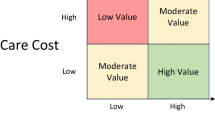Abstract
This paper examines the form of performance-based contract which is relatively new to healthcare systems. Economic theories on contracting are reviewed to provide theoretical support for potential impacts of performance-based contracting (PBC) on improving efficiency of the healthcare system. Implementation issues of PBC in healthcare practice are briefly discussed with examples in the literature reviewed. In addition, various economic incentives of PBC on provider behaviour are discussed, including its primary intended incentive on improving system efficiency, as well as incentives of risk selection on patients, improved matching between providers and patients, and gaming on reporting.
In summary, with a simple and economically valid idea of ‘rewarding good performance’ behind it, PBC is a potentially powerful contracting tool that could improve accountability, introduce competition, and improve the efficiency of healthcare resource allocation. In practice, PBC has been implemented and tested in various settings. Some preliminary evidence suggests that the implementation of incentive regulation such as PBC could increase healthcare outputs including access, quantity and effectiveness as well as reduce costs of care. However, it also introduces complicated incentives on providers which makes the evaluation of the effect of PBC on healthcare systems a challenging task, both theoretically and empirically. Furthermore, there are various practical issues, such as measurement of performance, which remain unsolved and make the implementation of PBC controversial. In the meantime, development of PBC in healthcare systems should remain cautious. More research on outcome evaluation and treatment effectiveness is needed to establish the link between financial incentives and healthcare outcomes.

Similar content being viewed by others
Notes
Due to the nature of the healthcare system, it is difficult for the principal to precisely monitor, and therefore contract on ‘outputs’. This further complicates the contracting in healthcare. However, the central concern in both standard contracting theory and healthcare contracting remains the same, which is how to motivate the agent to perform as the principal would prefer, taking into account the principal’s difficulties in monitoring the agent (either on the agent’s effort or output). Therefore, the results from the standard optimal contracting theory still have important implications for healthcare contracting.
Issues related to PBC have also been studied in other nonhealthcare public sector literature. For example, see Baker et al.[36] for a review of the empirical evidence on incentives provided by different executive compensation schemes in corporations.
There is, however, no explicit formulas defining level of funding as a function of the performance level. Nor is it described in the contracts what procedures the Maine government will use to evaluate performance results.
References
Jost TS, Hughes D, McHale J, et al. The British Health Care Reforms, the American Health Care Revolution, and Purchaser/Provider Contracts. J Health Polit Policy Law 1995; 20(4): 885–908
Vining AR, Globerman S. Contracting-out health care services: a conceptual framework. Health Policy 1999; 46: 77–96
Ellis RP, McGuire TG. Provider behavior under prospective reimbursement: cost sharing and supply. J Health Econ 1986; 5: 129–52
Donaldson C, Gerard K. Economics of financing health care: the visible hand. London: MacMillan, 1993
Ma CA, McGuire T. Optimal health insurance and provider payment. Am Econ Rev 1997; 87: 685–704
Newhouse JP. Reimbursing health plans and health providers: efficiency in production versus selection. J Econ Lit 1996; 34: 1236–63
Pauly MV. Fee schedules and utilization. In: Frech HE III, editor. Regulating doctors’ fees: competition, benefits and controls under Medicare. Washington, DC: AEI Press, 1991: 288–305
Pauly MV. Effectiveness research and the impact of financial incentives on outcomes. In: Shortell SM, Reinhardt UE, editors. Improving health policy and management: nine critical research issues for the 1990s. Ann Arbor (MI): Health Administration Press, 1992: 151–93
Ellis RP, McGuire TG. Optimal payments systems for health services. J Health Econ 1990; 9: 375–96
Blomqvist A. Monopolistic competition and supply-side cost sharing in the physician services market. Working paper. Ontario: University of Western Ontario, 1997
Dranove D. Rate setting by diagnosis related groups and hospital specialization. Rand J Econ 1987; 18: 417–27
Ma CA. Health care payment systems: cost and quality incentives. J Econ Manage Strat 1994; 3: 93–112
Borfitz D. Are you ready for the new grading system? Med Econ 1995 Aug; 72(160): 151–60
Grimaldi PL. Two steps to enhance managed care quality. Nurs Manage 1998 Aug; 29(8): 14–7
Commons M, McGuire TG. Some economics of performance-based contracting for substance-abuse services. In: Egertson JA, Fox DM, Leshner AI, editors. Treating drug abusers effectively. Malden (MA): Blackwell Publishers Inc., 1997: 223–49
Commons M, McGuire TG, Riordan MH. Performance contracting for substance abuse treatment. Health Serv Res 1997; 32(5): 631–50
Evans RG. Strained mercy: the economics of Canadian medical care. Toronto: Butterworths, 1984
Wedel KR, James C. Incentives for performance based contracting in service delivery to the elderly. Norman (OK): University of Oklahoma, School of Social Work; 1986 Apr. Report no. SHR-0014582 (prepared for Administration on Aging, Washington, DC)
Kamis-Gould E. The New Jersey performance management system: a state system and uses of simple measures. Eval Program Plann 1987; 10: 249–55
Griffin SR, Welch P. Performance-based public health in Texas. J Public Health Manage Pract 1995; 1(3): 44–9
Hanchak NA, Schlackman N. The measurement of physician performance. Qual Manag Health Care 1995; 4(1): 1–12
Hanckak NA, Schlackman N, Harmon-Weiss S. U.S. Health Care’s quality-based compensation model. Health Care Financ Rev 1996 Spring; 17(3): 143–59
Stevens L. Quality-based physician pay gets off to a slow start. Healthcare Resources 1998; 7(1): 1–5
Hartman SE, Mukamei DB, Panzer RJ. Ahospital payment system with incentives for improvement in quality of care: first lessons. Qual Rev Bull 1990; 16(7): 252–6
Geron SM. Regulating the behavior of nursing homes through positive incentives: an analysis of Illinois’ quality incentive program (QUIP). Gerontologist 1991; 31(3): 292–301
NHS Executive. A National Framework for Assessing Performance. Consultation Document, Leeds: NHS Executive, 1998
Goddard M, Mannion R, Smith P. Forthcoming. Enhancing performance in health care: a theoretical perspective on agency and the role of information. Health Econ. In press
Hausman D, Grand JL. Incentives and health policy: primary and secondary care in the British National Health Service. Soc Sci Med 1999; 49: 1299–307
Laffont JJ, Tirole J. A theory of incentives in procurement and regulation. Cambridge (MA): MIT Press, 1993; XXII: 705
Sappington DEM. Incentives in principal-agent relationships. J Econ Perspect 1991 Spring; 5(2): 45–66
Lu M, Ma CA, Yuan L. Risk selection and matching in performance-based contracting. Working paper 99-9. Calgary: University of Calgary and Institute of Health Economics, 1999
Holmstrom B, Tirole J. The theory of the firm. In: Schmalensee R, Willig R, editors. Handbook of industrial organization. Amsterdam: North-Holland, 1989
Nalebuff BJ, Stiglitz JE. Prizes and incentives: towards a general theory of compensation and competition. Bell J Econ 1983 Spring; 14: 21–43
Holmstrom B. Moral hazard in teams. Bell J Econ 1982 Autumn; 13: 324–40
Mookherjee D. Optimal incentive schemes with many agents. Rev Econ Studies 1984 Jul; 51: 433–46
Baker GP, Jensen MC, Murphy KJ. Compensation and incentives: practice vs. theory. J Financ Papers Proceed 1988 Jul; 43: 593–616
Gaynor M, Pauly MV. Compensation and productive efficiency in partnerships: evidence from medical group practice. J Polit Econ 1990; 98(3): 544–73
Norton EC. Incentive regulation of nursing homes. J Health Econ 1992; 11: 105–28
Institute of Medicine. Treating drug problems. Washington, DC: National Academy Press, 1990
Kerr S. On the folly of rewarding A, while hoping for B. Acad Manage J 1975; 18: 769–83
Holmstrom B, Milgrom P. Multitask principal-agent analyses: incentive contracts, asset ownership, and job design. J Law Econ Organ 1991; 7: 24–52
Baker G. Incentive contracts and performance measurement. J Polit Econ 1992; 100: 598–614
Freeland MS, Hunt SS. Selective contracting for hospital care based on volume, quality, and price: prospects, problems, and unanswered questions. J Health Polit Policy Law 1987 Fall; 12(3): 409–26
Sennett C, Legorreta AP, Zatz SL. Performance-based hospital contracting for quality improvement. J Qual Improve 1993 Sep; 19(9): 374–83
Chapin R, Silloway G. Incentive payments to nursing homes based on quality-of-care outcomes. J Appl Gerontol 1992 Jun; 11(2): 131–45
Newhouse JP. Reimbursing health plans and health providers: efficiency in production versus selection. J Econ Lit 1996; 34: 1236–63
Shen Y. Selection incentives in a performance-based contracting system. Boston (MA): Boston University, 1998
Lu M. Separating the ‘True Effect’ from ‘Gaming’ in incentive-based contracts in health care. J Econ Manage Strat 1999; 8(3): 383–432
Acknowledgements
Financial support from the Institute of Health Economics and Alberta Heritage Foundation is gratefully acknowledged. We thank Leigh-Ann Topfer for providing excellent assistance on literature search. The views expressed here are the authors’ alone.
Author information
Authors and Affiliations
Corresponding author
Rights and permissions
About this article
Cite this article
Lu, M., Donaldson, C. Performance-Based Contracts and Provider Efficiency. Dis-Manage-Health-Outcomes 7, 127–137 (2000). https://doi.org/10.2165/00115677-200007030-00002
Published:
Issue Date:
DOI: https://doi.org/10.2165/00115677-200007030-00002




